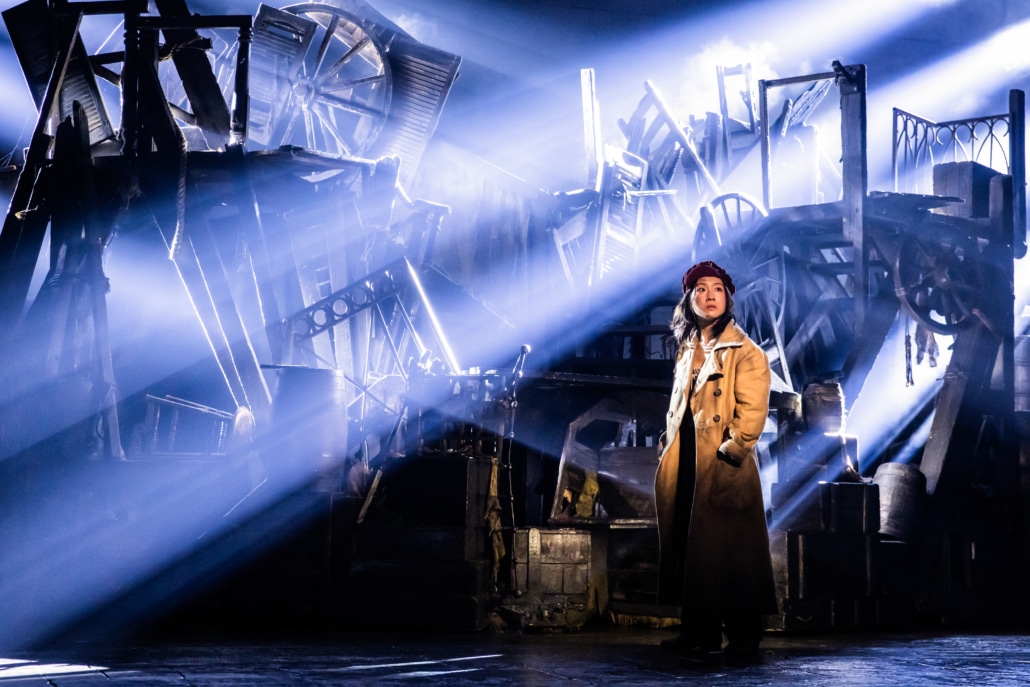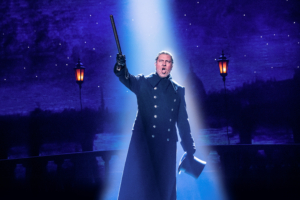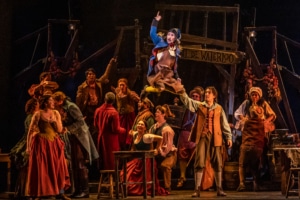DCPA NEWS CENTER
Enjoy the best stories and perspectives from the theatre world today.
Enjoy the best stories and perspectives from the theatre world today.
From the archives: this post was originally published on July 16, 2018

Christine Heesun Hwang as Éponine in Les Misérables. Photo by Matthew Murphy & Evan Zimmerman for MurphyMade
Hugo’s epic masterpiece returns to Denver bringing larger-than-life characters that are becoming more and more uncommon in our modern world
After its theatrical debut nearly 40 years ago, one has to ask: Why? Why does Les Misérables never seem to lose its luster? Is it the pathos? The action? The drama? The deep well of sentiment (as opposed to sentimentality) on which it draws? The pervasive heroics and genuine heroism of the piece?
The answer is all of the above, as well as producers — chiefly Cameron Mackintosh — who are good at keeping the production strong and fresh.
But hang on to that word heroism.

Preston Truman Boyd as Javert in Les Misérables. Photo: Matthew Murphy & Evan Zimmerman for MurphyMade.
In this second decade of the 21st century there is a hunger within for genuine heroes or, as Maya Angelou so wisely put it, “she-roes.” Les Miz has more than one of each, whereas our modern world is pretty much devoid of larger-than-life characters. It is a world where the late Joseph Campbell found “every last vestige of the ancient human heritage of ritual, morality and art … in full decay.”
Strong condemnation, but it is true that we have lost our dragon-slayers. We re-invent them in comic strips, on YouTube, film and television — or substitute a cult of celebrity in their steads. Thin gruel by comparison.
The English language classifies hero as masculine, but Angelou was more than half-right. The word is in fact derived from a woman’s name: Hero, the legendary Aphrodite who threw herself into the sea when her lover Leander drowned swimming the Hellespont just to be with her. Granted, that was more of an emotional than a moral response, and not all of Webster’s definitions of heroism are particularly exalted. The one that comes closest to paydirt is this: “Bravery, nobility, fearlessness, valor.”
Apply these words to Les Miz and you feel the richness — in Jean Valjean’s innate nobility and valor; in that half-pint Gavroche’s fearlessness; in Fantine’s bravery in the face of overwhelming odds, or Éponine’s readiness to take a bullet if it can save Marius, for whom she has an unrequited love. It’s even evidenced in the final act of Inspector Javert who can no longer bear to live with what he has become.
In the end, it is the totality of author Victor Hugo’s massive canvas that works — the contradictions of its operatic scope and its intimate humanity in a marriage of social, political and emotional upheaval with intensely personal stories of private pain and struggle.

(From L) Preston Truman Boyd as Javert & Nick Cartell as Jean Valjean in Les Misérables. Photo: Matthew Murphy & Evan Zimmerman for MurphyMade
And what stories they are. Not content to spin strictly subjective tales, Hugo wanted his entire world to reverberate through his writing. He said he wanted to be the écho sonore or “loud echo” of his day. Although he ostensibly belonged to no church, a religious thread frequently ran through his work. He claimed Les Miz as “religious.” But it is an eloquent compassion, wedded to innate wisdom and a sense of balance that are at the core of the grandeur of his prose.
Les Misérables was a very long book, full of plots and subplots, and took years to complete, but it was only following the accidental death by drowning of his grown daughter Léopoldine — a terrible blow — that he immersed himself in earnest into the writing of it. Memories of his daughter probably informed the character of Cosette, just as memories of his own student days informed that of Marius. Aside from his phenomenal agility with language, Hugo’s genius was a transcending talent for getting to the universal through the particular, weaving the smaller human tales into the sociopolitical fabric of his day.
Les Misérables was published in 1862 and took France and all Europe by storm. It was immediately translated into several languages. The author was astounded by the novel’s success. Even if people rarely plough through its almost 2,000 pages anymore, it remains his best-known work, largely because its popularity has been re-ignited by the musical’s charismatic appeal.

“Master of the House” from Les Misérables. Photo: Matthew Murphy & Evan Zimmerman for MurphyMade.
Toward the end of the novel, Hugo writes this: “The book which the reader has before him at this moment is, from one end to the other, in its entirety and details … a progress from evil to good, from injustice to justice, from falsehood to truth, from night to day, from appetite to conscience, from corruption to life, from bestiality to duty, from hell to heaven, from nothingness to God …
“So much for the lofty ambitions of the book. But one cannot discount the contributions of the team that created the musical, from bookwriter Alain Boublil’s ability to condense and adapt such a massive epic for the stage, to Herbert Kretzmer’s superlative English translation of the original French, to the stirring anthems by Claude-Michel Schönberg, who created a score that seems drawn from the novel’s rib.
More than 150 years after the novel’s publication, we still thrill to this account of an escaped convict’s struggle for a chance at redemption because its sensibility is true to any age. Hugo’s gift for evoking an ambiance of mystery, his operatic characters, the quest for justice where none exists, the depiction of a people in revolt, all contribute to this modern attraction. Jean Valjean may have all the earmarks of a hero but he goes them one better: He is a flawed, deeply injured and profoundly moral man who, in his vulnerability and compassion, becomes the idealized model of a person with whom we all want to identify.
French playwright Paul Claudel called Hugo’s vision his “panic contemplation” of the universe. Writer Léon Fargue called him “un poéte d’avenir” or “a poet of the future.” That future is now and Hugo’s masterwork remains as fresh, provocative and rousing as ever.“
DETAILS
Les Misérables
May 10 -21 • Buell Theatre
Tickets

Leave a Reply
Want to join the discussion?Feel free to contribute!